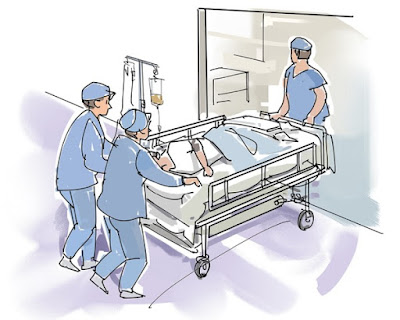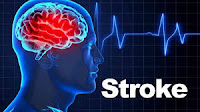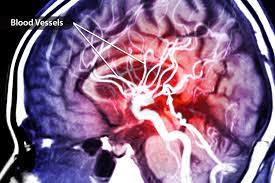I was well and then I wasn't. In one second, my life changed forever. I type with only one, functional hand and am the author of "The Tales of a Stroke Patient," the true story behind my hemorrhagic stroke and its consequences, including gruesome health professionals, frightful depression, and near-death encounters. I'll take you on the journey in this blog I've written for over 10 years, but be prepared for a bumpy ride. Contact info: Joyce Hoffman / hcwriter@gmail.com
Jun 6, 2021
5 F***in' Phrases We Should NEVER Say As Stroke Survivors to Each Other, In My Opinion
May 30, 2021
Invisible Disability: Determined TV has another episode!
The fan base keeps growing! This time, an Air Force veteran, a dentist, and a healthcare advocate? This particular episode is about 3 people who share something in common. Stroke! See what each of them has to say on this topic:
Invisible Disability
Then the audience can ask intriguing questions and make pointed comments. And don't be afraid to disagree. Mark Garman, who hosts the channel of Determined TV, chooses resilient people who can stand up for themselves.
If you or a family member want to appear on Determined TV or have suggestions for a topic, here's the way you do it:
Visit our website at: https://www.determined.live
May 29, 2021
About Caring for the Elderly, of Which (Gulp!!!) I Am One
I like to write my own stuff, love it actually. People ask me all the time if I would sponsor their guest articles, and my answer 99% of the time is a kind albeit emphatic no. But this time, I differed from the pattern. Whatever the condition, I believe it would help many. So here it is, written by Claire Wentz for Caringfromafar.com, asking the correct questions all who are in this situation should consider.
Claire writes:
For more insight into life as a stroke survivor, be sure to bookmark
The Tales of a Stroke Patient and More.
Image courtesy of Pixabay
Ease Your Mind (and Financial Burden) by
Planning for Long-Term Care
More of us are living well into our golden years than ever before. While it’s a wonderful thing to live longer, that often means requiring long-term care at some point. What are your plans for long-term care? If you require care, how will you pay for it?
Planning Starts Today
Statistics indicate the majority of people over the age of 65 will need long-term care at some point. As many as 58 percent of men aged 65 and older spend over two years requiring care, and 79 percent of women over 65 require long-term care for over three. With that in mind, how likely are you to need care?
Assess Your Need
Ask the following questions to determine whether you may need long-term care now or in the future:
Are there any home modifications you need to make? Many people opt for aging in place, and home environments usually require alterations to support that choice.
What lifestyle choices are you making now? How can you reduce the risk of injury or onset of illness? For instance, do you participate in high-risk hobbies such as mountain climbing or skydiving? Do you enjoy an unhealthy indulgence like cigarettes?
Are there hereditary illnesses and conditions that could impact you? Many people are predisposed to cancers that run in their families or issues like diabetes or heart disease.
Paying for Care
Understand Costs and Living Options
Long-term care can be expensive. While what you will pay depends on where you live and the amenities you want, it is not unusual to pay $90,000 per year or more. Are you counting on assistance from Medicare? It’s important to understand that Medicare doesn't cover long-term care after the first 100 days. (At that point, Medicaid coverage may be available, if you’re eligible.) Furthermore, as CNBC points out, you need to qualify financially for these services, and you can’t have more than $2,000 in assets to do so. The best way to discern the costs for long-term care is by talking to and visiting various communities in the Philadelphia area. Single out a few different options that offer the amenities you want, and take tours. Even if you don’t need LTC right now, some communities offer future residents the chance to put down a deposit.
Think Things Through
These concerns may seem far off, but you or a loved one may benefit from investing in a care plan right now. For instance, long-term care insurance premiums are lower if you invest in a plan at a younger age. You can also use pre-tax funds from your health savings account (HSA), if you have one, to pay for care.
Think about these issues when deciding on your course of action:
How close are you to retirement? You may have temporary disability insurance through your employer, but that won’t help once you retire.
What are the savings and insurance programs available to you now to help pay for long-term care? Many health insurance plans don’t cover long-term care.
How do you plan on paying for the costs of long-term care?
Other Options
In addition to long-term care insurance, there are a handful of options available for financing care costs. US News & World Report explains veterans can receive special assistance through the Department of Veterans Affairs, or you can use an HSA or get a reverse mortgage to pay for care. While reverse mortgages are an increasingly popular option for seniors who are 62 or older to supplement their income, you should consider this option carefully, as it comes with pros and cons.
Other avenues include tapping into your retirement accounts or selling the family home. If you opt to sell, you’ll want to find a realtor who is familiar with senior moves like this and who can help you get the best price for your home.
Ease Into Your Golden Years
Planning for long-term care is a healthy choice. Weigh your needs and options, and determine how you will manage should a need arise.
May 23, 2021
Determined TV has another post!
Jayesh Patel had a sweet family and was living a good life when his existence was interrupted by tuberculosis and meningitis which led to a subsequent stroke.
Below is the interview by the Determined TV with Varun Patel, Jayesh Patel's brother- in-law.
May 15, 2021
We tried a new way of group discussion. What do you think?
Three guest speakers for our first meeting:
Jessica Kruse
Jessica worked as a director of marketing of an architectural firm. In 2016, at the age of 36, a tear in her right carotid artery as a result of unknown neck trauma caused an ischemic stroke.
Jessica is currently recovering from a coma caused by stroke-induced epilepsy.
Frank Plemons works as a Dell sales coach. He is an avid biker. Years ago, when biking with friends, Frank ran into an accident which nearly killed him. He suffered a head injury which led to a stroke. Frank is otherwise very strong and healthy.
At the beginning, she could not walk or understand what was happening. After 8 years, she regained most of her functions and explored many things she did not touch before stroke, including yoga, tai chi, circuit training. She helped create a number of online media programs including hosting brain injury talk show and hand-in-hand show, the podcast program for Strokefocus.
Apr 27, 2021
WTF! They're Living People, For Cryin' Out Loud: The Sad Saga of Futile Trauma Transfers
I subscribe to everything related to health and stroke, and this article amazed even me, who rarely gets shocked anymore.
Apr 14, 2021
Young Multiple-Stroke Patient Gives Parent PTSD
Count 'em, folks. F-I-V-E!
This post all started from an email I received anonymously:
I'm the parent/caretaker of a 9yrs old pediatric stroke survivor. I have been suffering from PTSD since his first event. He is now 14yrs, has had 5 strokes to date and I call him a'thriver'. But I just never know when...the...next...might come? My son's condition will not 'get better' or just 'go away'. He will never 'get over it' and as a result, I've had to put my constant fear in my pocket and just keep going. I'd like to know more about studies done on 'parents' of pediatric stroke survivors and how common the PTSD experience is within this group.
That being said, you are not alone. Pediatric cancer, tumors, severe injuries,Type 1 diabetes, epilepsy, or other neurological disorders can cause post-traumatic stress. Symptoms may include:reliving the experience, avoiding remindersof the event or condition, feeling numb or detached from others, anxiety, difficulty concentrating and being constantly on the lookout for danger.
Most Notable: Riley Children's Health from ndiana University Health says an estimated 10-20% of parents with medically fragile children meet the clinical criteria for PTSD.
The triggers may be different, but the results can include hypervigilance, withdrawal, anger and guilt.
From the National Institutes of Health: "Despite evidence suggesting that rates of PTSD in parents decline over time, a significant proportion of parents continue to suffer clinically significant levels of distress in the long-term.
"It remains difficult to characterise the trajectory of parent distress over time for a number of reasons. Past research has mainly examined a single illness group, and many studies use different scoring tools and methods, making it difficult to determine trajectories over time, the predictors of functioning at different phases of the model, and whether illness factors or the type of illness contributes to different outcomes."
The Take a Breath Cohort Study from the Royal Children’s Hospital, Melbourne, Australia, is underway to determine how significant this problem is across different illness groups, and the "extent to which there is spontaneous resolution of symptoms requiring no further intervention, or to what extent early intervention is warranted."
The link, the study confirms, between parent psychological distress and notable childhood illness has phenomenal effects for pediatric healthcare and parental PTSD.
The study goes on to say, "A greater understanding of parent distress reactions and their impact will also assist in the allocation of resources to address this problem, with those potential resources ranging from basic psycho-education, to more involved psychological approaches (e.g.interventions based on cognitive behavioural therapy or acceptance and commitment therapy) to involvement with psychiatry can provide a map for treatments that are preventative, innovative, and targeted to the true needs of the child, family, and healthcare system.”
Kidshealth.org says, "Studies show that people with PTSD often have atypical levels of key hormones involved in the stress response.
"For instance, research has shown that they have lower-than-normal cortisol levels and higher-than-normal epinephrine and norepinephrine levels, all of which play a big role in the body's 'fight-or-flight' reaction to sudden stress. (It's known as 'fight or flight' because that's exactly what the body is preparing itself to do — to either fight off the danger or run from it.)"
https://blackbearrehab.com:
- Flashbacks can be scary to children and to parents as well.
- Depression, anxiety may arise.
- Hypervigilance may startle children.
- PTSD often leads to substance abuse.
So yes, you are not alone with PTSD and an ill child. To my readers, and to Anonymous, seek medical advice if you suspect PTSD, and you may be entitled to medical and other support. You have my best wishes in this unimaginable struggle.
Apr 10, 2021
Do You Think Stress Alone Can Cause a Stroke?
My stroke was inherited, a Protein S deficiency which causes blood clots. And you probably know the rest and the reason this blog came about.
I've been quite stressed lately because I've been inside, no thanks to the pandemic, and I thought, bordering on overthinking, would stress give a person a stroke? Or a second stroke?
Most people already understand that high blood pressure, high cholesterol, and smoking increase a person’s risk of stroke. But without those negative situations, can plain old stress cause a stroke? Unfortunately, studies have shown so, all around the world. Just a sampling....
The Copenhagen City Heart Study, who asked people about their stress levels and analyzed their health, concludes, “Self-reported high-stress intensity and weekly stress were associated with a higher risk of fatal stroke compared with no stress.”Garcia says that studying the correlation of stress on stroke was easier in younger people who had strokes because they were less likely to have health issues like high blood pressure that have been linked to stroke.
It's the chronic stress, not once-in-a-while stress, that can cause a stroke. Here is a list of many signs that you're in a stressful situation:
- Chest pain
- Sudden headaches
- Low energy
- Stomach problems such as diarrhea
- Tense muscles
- Shaking and/or cold sweaty hands
- Insomnia
- Dry mouth and difficulty swallowing
Mar 13, 2021
Physical Therapist: Push. Pull. Lift. Lower. Me: I'm 72, For Cryin' Out Loud!
 |
| Countless times on the therapy table |
I am always with pain in my affected stroke-induced leg, that sometimes gets unnoticed if I engage in an activity that I love, like watching Poldark again (which I have seen more times than I'll admit) or writing my blog (which I am doing now). I often wonder, when is it time to stop physical therapy (PT) altogether.
"In case you are not familiar with this principle, it states that, for most events, approximately 80% of the effects come from 20% of the causes. I believe this is applicable to rehab exercises – 80% of our results probably come from 20% of the exercises we give to patients (or should come from 20% of the exercises). This means that if you focus on the appropriate 3-4 exercises and cut out the rest, you will get similar results. And, I believe, better satisfaction from your patients."
Excellent thought, Dennis! More and more exercises may not be better.
Jan 30, 2021
Don’t Know Why You Had a Stroke? Maybe The Following News Will Help.
I didn't drink in excess, or smoke, or have diabetes, or have high cholesterol, or high blood pressure, or obesity, the main reasons why people have a stroke. I'll get to point, eventually. But first, some background.
Congenital Protein C or S deficiency is an inherited disorder. This means it is passed down through families. Congenital means it is present at birth.
The disorder causes abnormal blood clotting. One in 300 people has one normal gene and one faulty gene for protein C deficiency. Protein S deficiency is much less common and occurs in about 1 in 20,000 people. But overall, it's frequent, considering there are about 330 million in the US alone.
If you have this condition, either deficiencies of S and C, you are more likely to develop blood clots. The symptoms are the same as for deep vein thrombosis (DVT) and include:
Pain or tenderness in the affected area
Redness or swelling in the affected area
"Protein S deficiency may be hereditary or acquired; the latter is usually due to hepatic disease or a vitamin K deficiency. Protein S deficiency usually manifests clinically as venous thromboembolism (VTE)." Stroke, in other words.
The National Institutes for Health (NIH) says, "Protein S functions as a cofactor of activated Protein C. Its deficiency is a rare condition and can lead to deep vein thrombosis, pulmonary embolism or stroke. Protein S deficiency manifests as an autosomal dominant trait." [Explanation needed: To have an autosomal recessive disorder, you inherit two mutated genes, one from each parent. These disorders are usually passed on by two carriers.]
But the good news is there's a test for Protein S and C deficiencies, and who wouldn't want to know! A family member who shall remain nameless heard of my research into Protein S and C deficiencies, but he allowed the doctor to talk him out of it like the ostrich-head-in-the-sand approach.
If you really knew of those Protein S and C deficiencies, wouldn't you change your lifestyle a bit, like cut out all the causes mentioned in the very first paragraph?
|

















